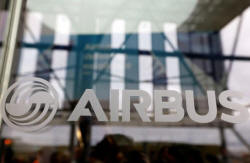|
Uncertainty over financing of the deal and political opposition
in the United States against Iran have slowed down Tehran's
efforts to import aircraft following the lifting of
nuclear-related sanctions this year.
Iran signed a $16.6 billion deal for 80 Boeing <BA.N> passenger
jets on Sunday and was said to be close to a deal with Airbus,
in the biggest package of firm contracts with Western companies
since Iran's 1979 revolution.
IranAir Chief Executive Farhad Parvaresh said he hoped to
finalize the deal with Airbus in two weeks.
"There are only a few small remaining issues like financing.
Airbus has agreed to provide financing for 17 planes," he was
quoted as saying by Tasnim news agency.
The first contract is expected to involve some 50-60 jets out of
118 provisionally ordered during a visit to France by Iranian
President Hassan Rouhani in January.
An Iranian official told Reuters in November that IranAir had
reached a deal with a foreign leasing company to finance the
first 17 jets from Airbus, boosting the prospects of finalizing
a deal to buy European aircraft.
Dubai's DAE Capital has been closely involved in the talks in
coordination with Airbus, according to industry sources, but the
leasing company has declined to comment.
Parvaresh said IranAir was trying to get first five Airbus
planes before March 2017, the end of the financial year.
Such a timetable would mean the first new passenger jets
reaching Iran ahead of presidential elections in May, widely
considered a key objective for pragmatist president Rouhani who
has faced hardline opposition to the aircraft deals.
Further details meanwhile emerged of Iran's deal with Boeing,
which depends partly on further financing agreements.
Parvaresh was quoted by Fars news agency as saying Boeing had
agreed to finance the first six planes it sells to Iran.
He also said Iran would pay for 15 percent of the value of the
jets from its development fund, with the rest to be financed
externally.
Industry sources expect Boeing, which faces Republican criticism
over trade with Iran, to deal with Iran via foreign lessors or
other financiers in order to avoid infringing core U.S.
sanctions restricting use of the U.S. financial system.
(Additional reporting by Tim Hepher; Editing by Tom Heneghan/Keith
Weir)
[© 2016 Thomson Reuters. All rights
reserved.] Copyright 2016 Reuters. All rights reserved. This material may not be published,
broadcast, rewritten or redistributed.
 |
|





